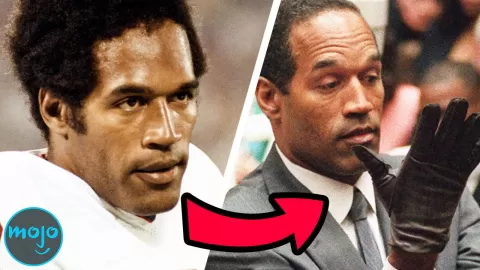OJ Simpson From Fame to Infamy

Part One: Go, O.J.! Go!
10 Times Internet Fame RUINED Lives
Despite being born Orenthal, a name his aunt suggested, Simpson was called O.J. as far back as he could remember. Following his parents’ separation, Simpson lived with his mother Eunice, a nurse’s aide, and his sister Shirley. Simpson grew up knowing little about his father Jimmy Lee Simpson, a prominent San Francisco drag queen who later came out as gay. Raised in Potrero Hill’s housing projects, Simpson fell in with the Persian Warriors, getting arrested three times before being out of high school. At 15, a friend introduced Simpson to Willie Mays of the San Francisco Giants, inspiring him to get his act together. Although Simpson wore leg braces during his youth, he matured into a promising athlete, joining his high school football team. Upon graduating, Simpson had the same two options as most young American men in 1965: The Vietnam War or college. Although Simpson’s grades weren’t great, he was able to attend City College of San Francisco. Continuing to pursue football, Simpson helped carry his team to a Prune Bowl victory. This gained the attention of colleges like the University of Southern California where Simpson transferred. While Simpson also took track, he made his claim to fame on the football field, pulling off a legendary 64-yard touchdown during his junior year and achieving the Heisman Trophy as a senior. The rising running back was the first overall pick during the 1969 NFL/AFL draft, entering a five-year deal with the Buffalo Bills for a staggering $650,000. Throughout his first three years with the Bills, Simpson didn’t live up to the expectations he established in college. Many felt he wasn’t properly utilized by coach John Rauch or his successor Harvey Johnson. Once Lou Saban took charge, he built the team’s offense around Simpson. In 1973, Simpson became the first NFL running back to exceed the 2,000-yard mark in a season, being named MVP. Although he never played in the Super Bowl, he’d go to the Pro Bowl six times. Simpson also accumulated 11,236 rushing yards throughout his career, nearly breaking the all-time record. By the time he was traded to the San Francisco 49ers, Simpsons’ football career had run its course, but he was just getting started as a performer. A few years before retiring, Simpson demonstrated his charisma as a spokesman through an ad campaign for the rental car company Hertz, popularizing the slogan, “Go, O.J., Go.” At the time, Black athletes were rarely featured in advertisements that weren’t specifically tailored for Black audiences with Simpson being seen as a trailblazer. Simpson became a brand, endorsing other products like Pioneer Chicken, Dingo Boots, and, naturally, TreeSweet orange juice. It wasn’t long until Simpson pursued a career as a professional actor, appearing in shows like “Roots” and movies like “The Towering Inferno.” His most famous role was the long-suffering Fred Nordberg in the “Naked Gun” trilogy. Little did the public realize that Simpson was constantly acting, hiding his true self behind a friendly smile.
Part Two: The Juice Is Loose
The final “Naked Gun” concludes with Nordberg running scared from Frank Drebin, a cop. The only thing more prognostic than this ending is that Simpson was considered for the titular role in “The Terminator.” James Cameron didn’t think Simpson would be convincing in such a violent role. Nicole Brown Simpson could’ve told Cameron otherwise. Just out of high school, Nicole Brown was working as a waitress when she met Simpson, who was still married to Marguerite L. Whitley. After their first date, Brown described Simpson as “forceful.” Despite this early warning sign, Brown was still drawn to Simpson, whose first marriage ended in 1979. Six years later, Simpson and Brown married, having two kids. At the height of Simpson’s movie career, his second marriage collapsed. In 1989, a hospitalized Brown accused Simpson of domestic violence, saying that he was going to kill her. Simpson pleaded no contest, but he received two years probation, 120 community service hours, and a $470 fine. Even after the marriage ended in 1992, tensions between Brown and Simpson escalated, reaching a boiling point on June 12, 1994. Brown and her friend Ron Goldman were discovered in the former’s L.A. condo, stabbed to death. The authorities immediately suspected Simpson, who agreed to turn himself in at 11:00 a.m. on June 17, the day after Brown’s funeral. Instead, Simpson found himself in a 1993 Ford Bronco SUV with his friend Al Cowlings behind the wheel and the authorities following. The low-speed chase overshadowed the 1994 NBA Finals with an armed Simpson allegedly threatening to take his life. Simpson ultimately surrendered while defense attorney Robert Shapiro assembled a “Dream Team.” O.J.’s counsel included F. Lee Bailey and Robert Kardashian, the latter of whom had made Simpson goddaughter to his second-born, Kim. Johnnie Cochran became the face of the defense with race developing into a key talking point throughout the trial. With many African Americans believing Simpson was innocent, it was feared a guilty verdict could spark another L.A. riot on the heels of the injustices Rodney King endured. Nevertheless, Marcia Clark and Christopher Darden, who replaced William Hodgman as lead prosecutor due to health issues, felt it was an open-and-shut case. The prosecution underestimated the jury’s ability to be unbiased, unaware one juror was a former member of the Black Panther Party. They also underestimated the public’s knowledge of DNA evidence, which pointed to Simpson. People could understand a glove not fitting, leading to one of the prosecution’s biggest mistakes. Provoked by Bailey, Darden asked Simpson to try on a pair of bloody gloves, one recovered from the murder scene and the other supposedly found behind the accused’s guest house. To Darden’s surprise, they seemingly didn’t fit. Granted, Simpson was also wearing latex gloves underneath while the leather gloves likely shrunk from the blood. Simpson also could’ve been exaggerating, but it was enough to define Cochran’s historic closing argument: “If it doesn’t fit, you must acquit.” Some felt comedian Norm Macdonald was doing a better job of proving Simpson’s guilt, leading to his exit from “SNL.” Meanwhile, Jay Leno spoofed Judge Ito, who was blamed for allowing the so-called “Trial of the Century” to become a theatrical media circus. The trial lasted nearly 11 months, but it only took the jury four hours to deliberate. The following morning, Simpson was declared not guilty on both counts. As some rejoiced, a growing majority argued that Simpson defined getting away with murder. Once seen as a potential bridge between white and Black audiences, Simpson only drove the country further apart. Simpson was a free man, but his accomplishments in football, film, and advertising would be an afterthought for the remainder of his life.
Part Three: O.J.: 30 Years of Infamy
Beyond the court of public opinion, Simpson faced further legal issues when Brown’s father, Lou Brown, and Goldman’s parents, Fred Goldman and Sharon Rufo, filed a civil suit. Found liable, Simpson was ordered to pay $33.5 million to the victims’ families. Although he ultimately only paid a small amount over the next 28 years, Simpson filed for bankruptcy with many of his possessions being auctioned off, including his Heisman Trophy. Simpson shattered any remaining illusions of innocence with his 2007 book, “If I Did It.” With the civil judgment still unfulfilled, the book rights eventually went to Goldman’s parents, who shrunk the “If” and added “Confessions of the Killer.” Simpson continued to clash with the law amid accusations of back taxes, battery, and money laundering. The authorities caught up to Simpson in September 2007 when he was arrested along with several others in Vegas. The charges included kidnapping and robbery, although the public saw this as a redo for his murder trial. This was emphasized by Simpson’s hefty sentence of 33 years in prison without parole for nine years. While Simpson had been a notorious name for over a decade, his second incarnation brought about multiple retrospectives of the 1994 murders, including the Oscar-winning documentary “O.J.: Made in America” and the Emmy-winning miniseries “The People v. O. J. Simpson: American Crime Story.” While some felt justice was served, Simpson was paroled in 2017. Over the next seven years, Simpson remained in the zeitgeist, even being referenced in the trailer for “Beetlejuice Beetlejuice.” Less than a month later, Simpson died at age 76 after living with prostate cancer for nearly a year. Simpson’s life can be divided into two eras: before and after the murders. The final 30 years overshadow the first 46, and for good reason. Yet, the glowing reputation Simpson developed during his heyday made the past three decades especially shocking and devastating. Some might say Simpson finally got what was coming to him, but to Fred Goldman, there’s still little closure to be found, saying, “It’s no great loss to the world. It’s a further reminder of Ron’s being gone.”

